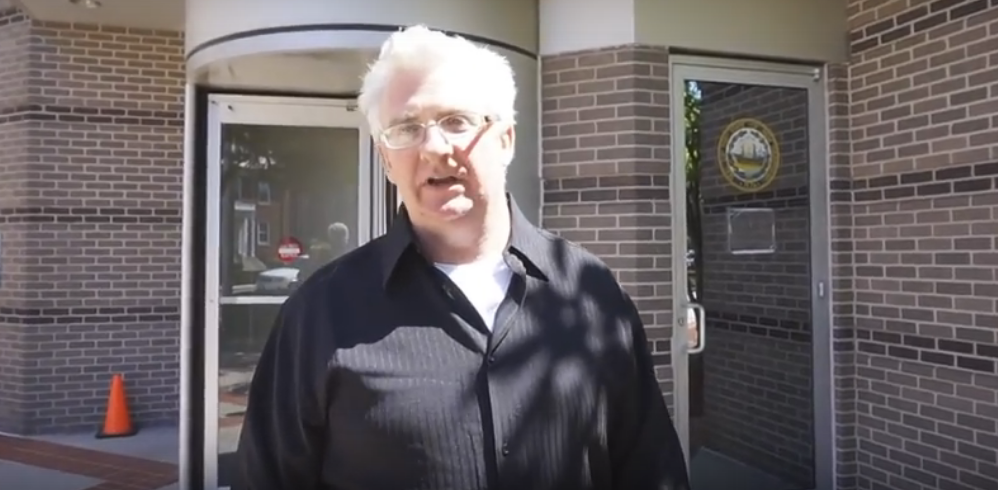
Prosecutor Michele Battaglia, left, and Public Defenders Michael Davidow and Suzanne Ketteridge are pictured as Eric Largy exits in the background at a recent hearing in Hillsborough County Superior Court South in Nashua.
NASHUA — The state is seeking to have Eric Largy jailed for six months for criminal contempt for allegedly violating his bail conditions by not fully participating in a recent competency evaluation ordered by Judge Charles S. Temple.
Assistant Hillsborough County Attorney Michele Battaglia also wants Largy’s public defenders Suzanne Ketteridge and Michael Davidow removed from his case claiming they know what happened with the competency hearing. “… and therefore, as necessary witnesses, they cannot be advocates for Mr. Largy,” Battaglia wrote in a motion for contempt filed Aug. 18 in Hillsborough County Superior Court South in Nashua.
Largy physically appeared at his evaluation, she wrote. “However, he did not agree to participate in the evaluation or answer any questions other than apparently to provide a written statement and a short verbal statement to Dr. Bader,” Battaglia wrote.
Davidow said in his response filed Tuesday that Largy did the best he could relative to the hearing. “To put it plainly, the prosecutor is not seeking to punish Mr. Largy for his refusing to follow this Court’s orders. The prosecutor is seeking to punish him for his being mentally ill (for so say the state’s own doctors),” Davidow wrote.
After being locked up for seven years without a trial or criminal conviction in connection with the alleged beating of father, retired Nashua Police Chief Clifton Largy in Nashua on April 22, 2009, Largy, 49, was reindicted on May 17.
Following the incident with his father seven years ago, Largy was held in Valley Street Jail for 18 months, deemed incompetent to stand trial, diagnosed with delusional disorder and involuntarily committed to the Secure Psychiatric Unit at state prison for five and a half years. The original criminal charges were dropped.
In April, Largy was ordered transferred to the New Hampshire Hospital, the state’s psychiatric hospital, where he was discharged on Aug. 1, then jailed for one week before Judge Temple released him on personal recognizance bail on Aug. 8 to await trial on the refiled criminal charges.
Davidow said the record indicates that while Largy is no longer deemed a danger, he still suffers from the delusional disorder that led to his having been found “not competent” in 2010.
Temple has already said that Largy’s bail will be revoked if he doesn’t follow his bail conditions, Davidow said.
“Asking to impose upon Mr. Largy a six month sentence for indirect contempt is therefore not only unnecessary, but also counter-productive. It gives him no incentive to ‘comply’ further. It merely cements in his mind that the State wants him incarcerated no matter what,” Davidow said.
When Battaglia re-indicted Largy, Davidow and Ketteridge moved to dismiss the charges – kidnapping and two counts of first-degree assault — based on Largy’s lack of competency. Temple rejected that argument and ordered Largy to be examined for competency as part of his bail conditions. The conditions also require Largy to stay away from his father and other family members.
Davidow said Largy duly appeared at his scheduled competency evaluation. “He presented several written statements and also engaged in a brief conversation with Dr. Bader, the state’s examiner,” Davidow wrote.
Largy’s actions do not represent any failure on his part to follow Temple’s orders that he “comply” with his referral for a competency evaluation, Davidow wrote. “To the contrary, they represent what Mr. Largy is capable of: no more and no less,” Davidow said.
Largy did what he could, Davidow said. “If a man is mute, he cannot be called into contempt for not speaking. If a man is paranoid, he cannot be called into contempt for being afraid to speak,” he wrote.
Competency evaluations take different forms for different individuals, he said. “Absent from the prosecutor’s motion is any reference whatsoever to whether Dr. Bader was able to glean what she needed to complete her work, from her brief, but trenchant encounter with Mr. Largy,” Davidow wrote.
To hold Largy in criminal contempt requires a finding of competency, which is lacking, he said.
For Largy’s part, he has maintained that he is not mentally ill and was defending himself from an abusive father who manipulated his case to deprive him of a trial seven years ago, allegations Clifton Largy denies. The senior Largy told police he was lured to his son’s house that day, attacked from behind and tortured for 12 hours. The father suffered fractured eye sockets and jaw that day.
Largy has said in the past that law enforcement wanted him silenced to protect its “dirty little secret” of domestic violence. On Wednesday, Largy said he is considering his options for speaking out, but didn’t disclose his specific plans.
Battaglia failed to show that Largy’s attorneys are necessary witnesses in the contempt proceeding she has asked for, he said. “Dr. Bader was there as well, and her testimony may well suffice,” Davidow wrote.
His attorneys have taken all due care to preserve and encourage Largy’s trust in them, and Judge Temple should take all steps possible before dissolving that professional bond, Davidow wrote.
The complicated case would have remained mostly confidential because involuntary re-commitment proceedings are held in the strictest confidence in Probate Court. When the state sought in March to lock Largy up for an additional five years at the Secure Psychiatric Unit, he took advantage of a provision in the law that allowed him to open his hearings so InDepthNH.org could report on his case.
Probate Court Judge David King called Largy’s case one of the most difficult he has seen in an involuntary re-commitment proceeding. He took note of the seven years of lost liberty Largy had already experienced without being tried and convicted of a crime.
King also restated what psychiatrists who treated Largy all agreed upon — that he was a nonviolent gentleman who helped weaker inmates and patients. All but one psychiatrist recommended Largy be locked up for another five years, however, complaining that he refused treatment for most of his years at the Secure Psychiatric Unit.
“Surely a lifetime commitment for a (2009) assault charge, which has not resulted in a conviction, is not how the courts can be expected to treat someone because he has a mental illness, absent clear and convincing evidence of present dangerousness,” King wrote in one order May 15.
During Largy’s last Probate Court hearing on July 26, his civil lawyer Shane Stewart submitted five memos from New Hampshire Hospital’s CEO Dr. Robert MacLeod to Largy’s then psychiatrist that showed the Attorney General’s Office was calling the shots as to when Largy would be released.
Stewart told the court the memos back up Largy’s claim that originally caused him to be declared not competent – that his father’s law enforcement connections played a role in his involuntary commitment, allegations Clifton Largy has denied.
“Eric’s concern and really the primary basis for (his) delusional disorder (diagnosis) is that he thought his father was influencing the process, that the chief law enforcement officer in the state – the Attorney General’s Office – had played a role in his going to the Secure Psychiatric Unit and had some say in whether he was being discharged or not,” Stewart said.
But the hospital’s lawyer, Lynne Mitchell, told the court that the memos contained legal advice from Associate Attorney General Anne Edwards relative to Largy’s risk assessment if he was to be released and had nothing to do with the criminal bureau.
“I didn’t want to have it misconstrued that it’s the criminal side saying, ‘hey don’t discharge him,’” Mitchell said.
Click here to read the five memos: CEO Robert MacLeod’s memos
Comments by Eric Largy after being released on bail on Aug. 8 in front of Hillsborough County Superior Court South in Nashua.





